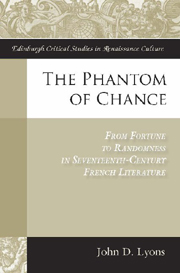Book contents
- Frontmatter
- Contents
- Preface: The Phantom of Chance
- Acknowledgements
- Series Editor's Preface
- Introduction
- 1 Fortune, Mistress of Events: Corneille and the Poetics of Tragedy
- 2 God in a World of Chance: Pascal's Pensées and Provincial Letters
- 3 From Chance Events to Implausible Actions: Lafayette and the Novel
- 4 The God of Suspense: Bossuet's Providential History and Racine's Athalie
- 5 An Accidental World: La Bruyère's Characters
- Conclusion
- Bibliography
- Index
Conclusion
Published online by Cambridge University Press: 12 September 2012
- Frontmatter
- Contents
- Preface: The Phantom of Chance
- Acknowledgements
- Series Editor's Preface
- Introduction
- 1 Fortune, Mistress of Events: Corneille and the Poetics of Tragedy
- 2 God in a World of Chance: Pascal's Pensées and Provincial Letters
- 3 From Chance Events to Implausible Actions: Lafayette and the Novel
- 4 The God of Suspense: Bossuet's Providential History and Racine's Athalie
- 5 An Accidental World: La Bruyère's Characters
- Conclusion
- Bibliography
- Index
Summary
The seventeenth century marked the decline of a totalising, centralising, personalising, spectacular and didactic view of chance – Boethian Fortune – in favour of a punctual, decentred, impersonal, imperceptible and amoral form of contingency, often designated by the term hasard. There are many consequences, or symptoms, of this shift.
A set of conventional, highly noticeable or spectacular markers of chance, typical of romance and tragi-comedy early in the seventeenth century, was increasing derided by critics and theorists of drama and narrative. The shipwrecks, bolts of lightning and earthquakes that might disrupt lives in romance and romance-like drama in the first third of the century appeared less frequently later in the century. Chance still played an important role, but increasingly in the form of inconspicuous yet convenient coincidences of timing, of lost objects and of overheard conversations. Although chance moved into the background, it wove itself more thoroughly into everyday life and became an essential component of existence as it was portrayed in novels, tragedies and apologetic discourse.
As part of the everyday world, chance became more egalitarian. The humble chance events of novellas and fabliaux mingled with the heroic incidents of epic and tragedy so that contingency did not plot itself primarily in the arc of rise and fall nor did it appear solely in the major events of clear historical importance. Henceforth, chance appeared in accounts of the poorly washed preacher, the cuckolded husband, the falling roof tile, the shoemaker's choice of vocation, the interrupted card game.
- Type
- Chapter
- Information
- The Phantom of ChanceFrom Fortune to Randomness in Seventeenth-Century French Literature, pp. 196 - 198Publisher: Edinburgh University PressPrint publication year: 2011



